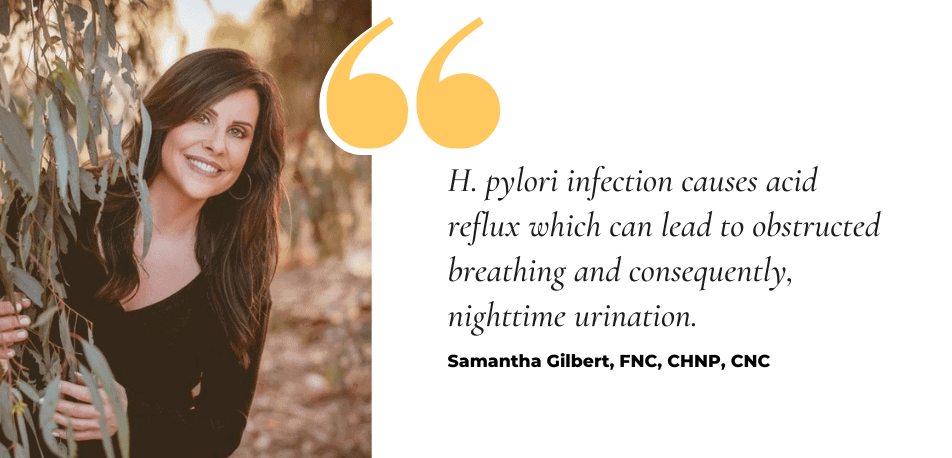Nighttime urination is a common problem across all age groups. It affects men, women, and children. If you find yourself waking up around 3 a.m. or if you have nightly bathroom trips that seem to occur like clockwork every 90 minutes, then this episode is for you.
There are several reasons why you might struggle with nighttime urination. Many people assume it’s due to drinking too much water before bed, but this is less common than you might think. An overactive bladder in women, an enlarged prostate in men, kidney stones, liver problems, diabetes, and congestive heart failure can all cause nighttime urination. But today, I want to talk about two overlooked underlying causes of nighttime urination: gut inflammation and breathing problems (specifically sleep apnea).
I believe sharing is caring, so I have a favor to ask. If my show is helpful to you, please share this podcast and consider leaving a review in Apple Podcasts. It is through sharing that we create community, eliminate guilt and shame, and bring about healing. Thank you in advance for taking three minutes out of your day to support my show so others can find me.
In this episode, I discuss:
- Nighttime urination is common and can be caused by various health issues, but often overlooked causes include gut inflammation and breathing problems
- Gut inflammation can be caused by an overgrowth of inflammatory microorganisms, affecting the microbiome and leading to health problems such as breathing issues
- Sleep apnea can cause nighttime urination as it creates a vacuum in the chest cavity, leading to more urine production
- H. pylori infection can cause a range of symptoms, including acid reflux, which can lead to obstructed breathing and consequently, nighttime urination
- Treating root causes like H. pylori infection and addressing lifestyle factors, such as diet and sleep habits, can help alleviate nighttime urination
Listen to the podcast here:
Links:
- Prevalence of Helicobacter pylori in adenotonsillar hypertrophy in children
- Night-time frequency of urination as a manifestation of sleep-disordered breathing: the Nagahama study
- Excessive Nocturnal Urine Production is a Major Contributing Factor to the Etiology of Nocturia
- Short-Term Antibiotic Treatment Has Differing Long-Term Impacts on the Human Throat and Gut Microbiome
- Polymorphism of virulence genes and biofilm associated with in vitro induced resistance to clarithromycin in Helicobacter pylori
The Link Between Gut Inflammation and Nighttime Urination
Since an inflamed gut can significantly impact breathing and is also a culprit in sleep apnea, let’s start here. As I’ve shared in previous episodes, gut inflammation can result from a variety of underlying causes. However, the most common cause is an overgrowth of inflammatory microorganisms such as bacteria, fungi, and protozoa. Your microbiome is defined as all of these organisms, including their genetic elements, and is a highly intelligent ecosystem.
The reason why you should first focus on gut inflammation is that inflammation a major underlying factor in all of the health problems I mentioned previously, especially breathing problems, including asthma. You’ll see results in other areas of health, too.
Keep in mind you don’t have to have sleep apnea to have a nighttime breathing problem, although this is a commonly overlooked reason why many people struggle with nocturnal urination.
Sleep Apnea and Its Effect on Nighttime Urination Patterns
Sleep apnea is a condition that occurs when your throat closes off as you inhale while sleeping, causing you to stop breathing multiple times during the night. To be officially diagnosed with sleep apnea, you need to have a certain number of these episodes every hour, each lasting more than 10 seconds. Contrary to popular belief, sleep apnea can equally impact under and overweight individuals.
Each time you stop breathing during the night and attempt to breathe in against a blocked throat, a vacuum is formed in your chest cavity, which expands your heart’s atrial chambers. This leads your heart to believe it’s overfilled with blood. To counter this, your heart produces a hormone known as atrial natriuretic peptide (ANP), which goes to your kidneys to produce more urine, consequently lowering your blood volume.
Apneas tend to happen most frequently during REM sleep, a stage where dreams occur and muscles are entirely relaxed. The initial REM cycle starts approximately 90 to 120 minutes after falling asleep, repeating every 90 to 120 minutes. As the night progresses, REM stages extend while deep sleep stages reduce. The lengthiest REM cycle usually begins around 3 a.m.
If you have been dealing with sleep apnea, then your body is likely producing small amounts of urine at regular intervals. This causes your bladder to fill up and expand later in the night. Typically, if you are facing this condition, you’ll find yourself waking up around 3 a.m., plus or minus 20 to 30 minutes, often at the same time each night. If you are waking up multiple times during the night, it’s usually around 90 minutes apart, correlating to one sleep cycle.
H. Pylori: A Hidden Culprit Behind Nighttime Urination
Let’s return to the gut. Another reason you might not be breathing well at night is a common but often overlooked bacteria.
Since acid reflux is a common underlying cause of obstructed nighttime breathing, let’s talk about why this is happening to begin with. While it may seem odd, GERD and acid reflux occur because of low stomach acid. Most of the time, this is due to an overgrowth of the Helicobacter pylori bacterium, otherwise known as H. pylori, which is notorious for lowering stomach acid. Please note you don’t have to struggle with acid reflux to have a breathing problem due to an overgrowth of pathogenic bacteria. In fact, many people who come to me for help do not have acid reflux as a symptom of an H. pylor infection. In these cases, they present with other symptoms, which I’ll share in a bit.
H. pylori is a distinctive bacterium due to its flagellation. Flagella, which are whip-like structures, enable H. pylori to navigate toward the surface of the mucosal cell, thus evading the acidic interior of the stomach and preventing its elimination through mucus flow. This characteristic is also why they are predominantly responsible for most duodenal and gastric ulcers, as the flagella allow them to burrow and effectively create perforations in the stomach.
It’s estimated that over half of the global population is inhabited by H. pylori. Despite being the most prevalent bacterial infection globally and being responsible for most duodenal and gastric ulcers, it escalates the risk of gastric cancer by two to three times. However, only 10% to 15% of those infected with H. pylori will suffer from peptic ulcer diseases, and a mere 1% to 3% may develop gastric cancer.
The Role of H. Pylori in Digestive and Respiratory Health
Even if you don’t develop gastric cancer, living with an overgrowth of H. pylori can be really painful, with a wide range of symptoms that go beyond digestive distress. Here’s a list of common health problems I see in my clinic that are a result of H. pylori infection:
- Bloating
- Gas
- Belching
- Indigestion
- Nausea
- GERD and acid reflux
- A constant feeling of fullness in the upper part of the stomach
- A lump in the throat sensation
- Chronic dry cough
- Throat clearing and post-nasal drip
- Bad breath
- Constipation or diarrhea
- Insomnia
- Headaches and migraines
- Iron deficiency anemia
- Skin problems such as rosacea, acne, eczema and psoriasis
- Asthma
- Canker sores
- Hashimoto’s thyroiditis
- Heart palpitations
H. pylori has also been found in the oral cavity, leading researchers to find it in the ears, nose, and throat. It’s been linked to several conditions, including ear infections and adenotonsillar hypertrophy (a leading cause of obstructive sleep apnea syndrome in children), nasal polyps, and chronic sinus infections.
H. pylori can also cause brain fog, anxiety, and depression. If you or your family have a history of gastritis and/or Hashimoto’s, you should definitely consider properly testing for H. pylori because it is often the culprit in these conditions. Testing should be done via stool qPCR, such as a GI Map, which is what I use in my clinic. Research has demonstrated that qPCR is highly effective in identifying H. pylori in both gastric biopsy and stool samples. Regrettably, standard testing procedures for H. pylori don’t utilize this technology, leading to many cases going unnoticed. Patients are often incorrectly informed that they don’t have the infection, even when they exhibit many related symptoms. Sadly, I see this a lot in my practice as well.
H. pylori is typically contracted during childhood and can remain as a chronic infection if not treated. It can be transmitted from one individual to another through direct contact with saliva, vomit, or fecal matter. Even pets, particularly dogs, can pass it on to their owners. Contaminated food or water can also be sources of transmission, but it’s most commonly spread through person-to-person contact, such as kissing or sharing saliva. This can happen by eating from the same plate, using shared utensils, drinking from the same glass, or children playing with toys that have been drooled on by other infected children. Additional transmission routes can include consumption of well water, raw or undercooked food, and exposure to endoscopy equipment.
H. Pylori and Gut Inflammation: A Threat to Sleep Quality
So back to acid reflux and obstructed breathing. When we address the root causes, in this case, an H. pylori infection, we heal the gut inflammation that was causing the obstructed breathing and, therefore, nighttime urination. Keep in mind that what comes up is not only acid but also bile; digestive enzymes and bacteria can rise up. Research has actually discovered pepsin, a stomach enzyme, in the sinuses and middle ears, as well as in the lungs of individuals with chronic lung conditions, accompanied by lipid-loaded macrophages.
This gives us a clue as to how your digestive organs should work harmoniously together. If stomach acid production is insufficient, it can disrupt the hormonal signals from the duodenum to the pancreas, which triggers the release of enzymes and bicarbonate, or pancreatic juice. This juice controls bile production and release. The body uses bile and bicarbonate, both highly alkaline, to balance the acidity of partially digested food entering the duodenum, ensuring optimal pH for pancreatic enzyme activity. If the pH is too acidic or too alkaline, enzyme activity diminishes, resulting in poor digestion and food absorption, which can affect your breathing during sleep. Additionally, stomach acid is your inherent antimicrobial substance that kills off the bad bacteria present in food at the time of consumption. Bile is also an antimicrobial substance, so it makes sense that when your digestive system is not functioning the way it should, an overload of inflammatory microorganisms can flood your system, leading to all sorts of health problems, including breathing issues and nighttime urination.
Impaired digestion and gut inflammation will also impact important hormones such as melatonin and serotonin, which are required for balanced sleep and organs to work properly. In fact, studies have shown that H. pylori-infected individuals have decreased expression of melatonin-synthesizing enzymes, which can be associated with low secretion of melatonin in the gastric mucosa.
A side note: I’m not a fan of the traditional H. pylori treatment because the antibiotics used have a high rate of antibiotic resistance, and studies have shown to kill good bacteria to the point that, even several years later, have still not recovered to normalcy. Please work with a practitioner that understands this bacterium and how to properly treat it. Diet is also a key factor in healing H. pylori.
Commonly I hear, “I’m getting older, so I guess I have to live with waking up to pee in the middle of the night.” Please know this is not a normal part of aging. Studies have shown that the more frequently you wake up to urinate during the night, the higher your mortality rate. A study published in the Journal of Urology in 2011 revealed that men aged between 20 to 40 who wake up at least twice a night to urinate face a 2.5 times increase in their overall mortality rate. For post-menopausal women aged 50 to 64 who experience the same, their overall death rate is approximately twice as high.
After treating an H. pylori infection that can impair hormones and cause nighttime breathing issues and sleep apnea, people often find that their nighttime urination stops or becomes less severe.
A Client Success Story: Overcoming Nighttime Urination and Digestive Problems
As I close, I’d like to share a story of a 46-year-old woman who came to me for digestive problems, sleep apnea with nighttime urination, and fatigue. Since childhood, she reported always having a feeling of fullness in the upper portion of her stomach, along with belching, gas, and bloating. She also stated, “I’ve always had rosacea no matter what I do to try and fix it.” As I suspected, she had very high levels of H. pylori in her stool. Keep in mind if it’s high in the stool, it’s even higher in the stomach and potentially the other areas I mentioned previously, such as the oral cavity, ears, nose, and throat.
So we went to work changing her diet and incorporating botanical treatments, along with enzymes and other therapies, to eradicate the infection. She was also a nighttime snacker, so I had her stop eating at least four hours before bedtime, along with regular sleep and eating schedules. I also had her try special mouth tape before bed to ensure she was breathing through her nose. Within three months, she was a new woman. Her lifetime digestive problems went away, her skin cleared up, her energy improved to the point where she was able to start working out again, and her nighttime urination also stopped. I’d also like to add that her depression went away because we addressed the root cause of her suffering.
Thanks for being with me today. I trust today’s episode has blessed you, and I look forward to being with you next time.
I believe sharing is caring, so I have a favor to ask. If my show is helpful to you, please share this podcast and consider leaving a review in Apple Podcasts. It is through sharing that we create community, eliminate guilt and shame, and bring about healing. Thank you in advance for taking three minutes out of your day to support my show so others can find me.








